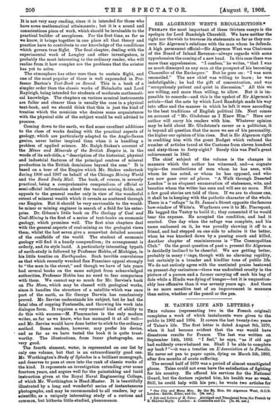SIR ALGERNON WEST'S RECOLLECTIONS.* PERHAPS the most important of these
thirteen essays is the apologia for Lord Randolph Churchill. We have neither the right nor the wish to traverse its statements so far as they con- cern Sir Algernon's relations with the man whom he defends. A high permanent official—Sir Algernon West was Chairman of the Board of Inland Revenue—always regards with some apprehension the coming of a new head. In this case there was more than apprehension. "I confess," he writes, "that I was as much dismayed as any man at the prospect of his becoming Chancellor of the Exchequer." But he goes on : "I was soon reconciled." The new chief was willing to learn ; he was indefatigable ; he had the gift of concentration, and was "scrupulously patient and quiet in discussion." All this we are willing, and more than willing, to allow. But it is im- possible to concede—and this is the upshot of Sir Algernon's article—that the acts by which Lord Randolph made his way into office and the manner in which he left it were according to the best traditions of English political life. Next comes an account of "Mr. Gladstone as I Knew Him." Here our author will carry his readers with him. Whatever opinion may be held about Mr. Gladstone's career as a politician, it is beyond all question that the more we see of his personality, the higher our opinion of him rises. But is Sir Algernon right in crediting him with the great Budget which reduced the number of articles taxed at the Customs from eleven hundred and sixty-three to forty-eight Surely this was Peel's great achievement in 1842.
The chief subject of the volume is the changes in manners which the author has witnessed, and—a cognate topic—the recollections of men whom he has seen, with whom he has acted, or whom he has opposed, and who are now gone over ad plures. "A Walk through Deserted London" is an eloquent enumeration of statesmen, wits, and beauties whom the writer has seen and will see no more. Not a few good stories are told of them. If we are to choose one, it shall be in keeping with the pathetic character of the whole. There is a " ref uge " in St. James's Street opposite the famous bow-window of White's. Wayfarers owe it to Mr. Pierrepont. He begged the Vestry to build it ; they consented if he would bear the expense. He accepted the condition, and had it erected. One day when the refuge was complete, and his name embossed on it, he was proudly showing it off to a friend, and had stepped on one side to admire it the better, when he was knocked down by a passing coach and killed. Another chapter of reminiscences is "The Cosmopolitan Club." On the great question of past v. present Sir Algernon is decidedly inclined to be cheerful. We are getting better, probably in many t ings, though with no alarming rapidity, but certainly in a broader and kindlier tone of public life. We do not entirely agree with the unstinted praise bestowed on present-clay caricature—there was undoubted cruelty in the picture of a parson and a farmer carrying off each his bag of dole while a Hindu was dying of hunger—but it is unquestion- ably less offensive than it was seventy years ago. And there is no more sensitive test of an improvement in manners than satire, whether of the pencil or the pen.


































 Previous page
Previous page